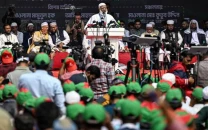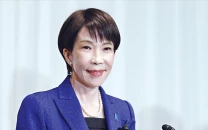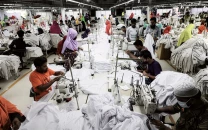China accuses Taiwan’s President Lai of 'escalating tensions'
Beijing issues warning in response to Lai’s comments on Taiwan’s sovereignty signaling possible military response

China has accused Taiwan’s President Lai Ching-te of deliberately escalating tensions with “sinister intentions” as he prepares to deliver a keynote speech marking Taiwan’s National Day.
Beijing issued a sharp warning in response to Lai’s recent comments on Taiwan’s sovereignty, signaling the possibility of a military response.
Lai, who took office in May 2024 after a landslide victory in January’s election, is a vocal supporter of Taiwan’s independence. He is deeply disliked by China, which considers Taiwan a breakaway province and views Lai as a “separatist” leader seeking to sever ties with the mainland.
Lai’s government firmly rejects China’s territorial claims, maintaining that Taiwan has never been under the control of the People's Republic of China.
Over the weekend, Lai stated that it was "impossible" for the People’s Republic of China to be Taiwan’s motherland, pointing to Taiwan’s deeper historical and political roots.
In response, China's Taiwan Affairs Office criticized Lai for pushing a narrative that the two sides of the Taiwan Strait are separate countries, a stance that Beijing considers a threat to its sovereignty.
“Lai Ching-te’s Taiwan independence fallacy is just old wine in a new bottle,” the office said in a statement. It further accused Lai of promoting confrontation and hostility.
Lai is set to deliver his main National Day speech on Thursday, a date significant for both Taiwan and China. The day commemorates the 1911 revolution that overthrew China’s last imperial dynasty and established the Republic of China (ROC), which remains Taiwan’s official name.
Following the Chinese Civil War in 1949, the ROC government fled to Taiwan after being defeated by Mao Zedong’s communist forces, while the People’s Republic of China (PRC) was established on the mainland.
Since then, Taiwan has operated as a self-governing entity, although Beijing claims it as part of its territory.
The speech is expected to touch on Taiwan’s independence, a sensitive topic for China, which has consistently opposed any moves that appear to formalize Taiwan’s separation from the mainland.
Taiwanese officials anticipate that Lai’s address could provoke Chinese military exercises as Beijing seeks to pressure the island into accepting its claims of sovereignty.
In the lead-up to Lai’s speech, China has intensified military activity around Taiwan.
Chinese forces regularly conduct joint combat readiness patrols and other drills near the island.
Taiwan’s defense ministry reported that it continues to monitor China’s military maneuvers, accusing Beijing of using these exercises to “legitimize” its pressure tactics.
China’s military posture has been further bolstered by joint drills with Russia in the Western Pacific and the test-firing of an intercontinental ballistic missile last month.
Taiwanese officials believe that following Lai’s speech, China will use military drills as a pretext to increase pressure on the island.
The rising tensions also involve the United States, which approved a $567 million defense package for Taiwan last week, further angering Beijing. China’s defense ministry responded by reiterating its stance that arming Taiwan encourages “Taiwan independence” and warned that this could lead to war.
A US State Department spokesperson urged China to avoid using public remarks or routine celebrations as an excuse for provocative actions, calling for peace and stability in the Taiwan Strait.
China’s leadership, including President Xi Jinping, has repeatedly emphasized the importance of reunification with Taiwan, describing it as an "irreversible trend" in line with the will of the Chinese people.
Xi recently reaffirmed Beijing’s commitment to opposing Taiwan’s independence and warned that the use of force remains an option to achieve unification.
Despite these threats, Lai has maintained that only Taiwan’s people can determine their future and has continued to offer dialogue with Beijing—offers that have been consistently rejected by Chinese authorities.
Tensions between China and Taiwan have escalated steadily since Lai's inauguration, with China conducting "punishment" war games around the island earlier this year.
As Taiwan’s National Day approaches, all eyes will be on Lai’s speech and the potential fallout from China’s response, with regional stability hanging in the balance.



















COMMENTS
Comments are moderated and generally will be posted if they are on-topic and not abusive.
For more information, please see our Comments FAQ